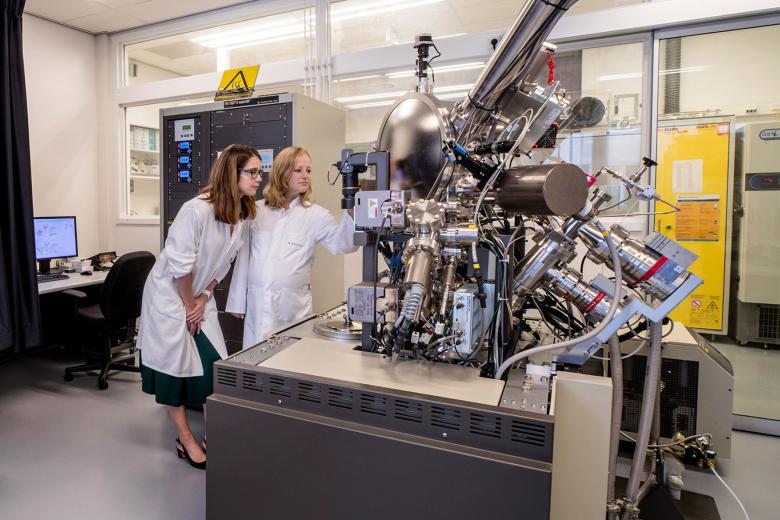You can train your sweat glands
Sweat stains on your shirt, foul odours or pit stains under your arms: some people cringe just thinking about it. And, of course, excessive sweating can be an annoying discomfort. Perspiration is above all a mechanism to prevent overheating. And good news: you can train your sweat glands. Biology prof. dr. Wouter van Marken Lichtenbelt explains.
Sweat is a gift of nature
We often think of sweating as a problem, but it is actually a gift from nature. The ability of our pores to secrete moisture keeps us from overheating or even dying in tropical temperatures. The blood gets rid of the excess heat through the skin via the sweat that we secrete. As the moisture evaporates, we lose that heat.
As a specialist in thermoregulation* and energy metabolism, van Marken Lichtenbelt is naturally interested in sweat. ‘Sweat is essential for cooling human bodies and plays a role in the energy balance. If the temperature in the environment is around 37°C, sweating is the only way for a person to release heat. That is necessary because you yourself generate heat, in addition to the outside temperature. Without sweat, your body temperature could rise above 42°C, which would be life-threatening.’
You can train sweat glands
People who want to exert themselves physically not only need to train their fitness and muscles, but also their sweat glands. ‘By regularly being in hot environments or making considerable efforts, you can triple your sweat capacity from an average of one litre per hour to three. Exercising intensively or regularly exposing yourself to heat will lead you to not only develop more sweat glands, but for them to grow larger.’
You need to train your sweat glands before you begin a strenuous endeavour. If you try to take part in an event like a four-day hike without being well trained beforehand, you are at a greater risk of life-threatening overheating. It is also important for everyone to drink at least one litre of water per hour during such an event, especially when temperatures are high.
Excessive sweating is biologically inefficient
In theory, it is ideal if all the moisture you secrete evaporates immediately, so the heat is released as quickly as possible without unnecessary water loss. But excessive sweating in which your hair gets wet or water streams down your back can be annoying and thus doesn’t actually make sense.
‘Purely biologically, excessive sweating is not good because it’s inefficient. In fact, it is most beneficial if every drop of sweat evaporates, giving you optimal heat dissipation. If the sweat is running all over your body, you only lose unnecessary moisture. People who sweat excessively may just be unlucky. But sometimes there is a cause, such as being overweight or taking certain medications.’
Perspiring animals
Not all animals sweat. Monkeys and many ungulates such as horses do, but birds and dogs do not. Dogs have another clever cooling strategy: they pant with a moist tongue. Because the body sends a lot of blood to the tongue, it can give off a great deal of heat. Cats only have sweat glands under their feet, but none in the skin. They dissipate heat by licking themselves over their entire bodies. Elephants also have no sweat glands under the skin because, given their size, they would not really be useful. Instead, they keep their heads cool in hot weather by using their trunks to spray themselves with water. They also expel heat by sending warm blood to their huge ears.
Sweat is odourless
‘People who sweat heavily can often smell and sometimes even stink. That’s one reason for people to wash themselves regularly and use deodorant. However, the sweat itself has no odour. It consists of 99% water and is completely odourless. Perspiration only leads to unpleasant smells when it comes into contact with certain bacteria on the skin. Your feet have the most sweat glands: 250,000 per foot. So the chance that bacteria will cause foul odours to arise there is not imaginary. Some people and their partners are plagued their entire lives by “sweaty feet”. Fortunately, there are special preventative sprays that can help them avoid a lot of misery.’
Cold sweat
A fun fact is that we have two kinds of sweat glands: eccrine and apocrine. The eccrine glands are spread over the entire body and provide regular sweat for cooling. The apocrine glands around the armpits and genitals produce more oily sweat. That sweat is intended for sexual attraction, but in situations of intense stress they can also produce quite smelly sweat under your armpits and on your head. In those kinds of situations, you literally break out in a cold sweat....
What you should know about sweating...
- Perspiration is vital in a warm environment; otherwise, we would quickly overheat and die.
- Sweat glands are everywhere: there are more than a million on your body, and 250,000 on a single foot.
- When exerting yourself (walking) in tropical temperatures, it is important to drink one litre of water per hour to keep your sweat production going. Otherwise, you are at risk of overheating.
- People who play sports and exercise are also training their sweat glands, in number and size.
- Sweat itself does not stink; it is odourless and 99% of it is water. Perspiration only leads to unpleasant smells when it comes into contact with certain bacteria on the skin.
- In addition to regular sweat (eccrine), there is also apocrine sweat. This more oily sweat smells and in intended for sexual attraction. A ‘cold sweat’, especially from your underarms, comes from the apocrine glands.
- Some people sweat significantly more than others, and it’s not clear why. Being overweight and/or taking certain medications can play a role in excessive sweating. Excessive sweating is called hyperhidrosis and it can complicate your life. Fortunately, something can usually be done about it.
- Excessive perspiration is biologically inefficient.
About Professor Wouter van Marken Lichtenbelt
Professor Wouter van Marken Lichtenbelt was recently nominated for the Huibregtsenprijs based on his temperature research (click here for the press release about the nomination). The prize went to Prof. Jolanda de Vries from Radboud University.This national prize is awarded to a scientifically innovative research project that has a social application.
Source: www.gezondidee.mumc.nl
Also read
-
UM to play a more prominent role in Dutch scientific infrastructure
Eleven consortia from various scientific disciplines are set to launch projects of great value to science. The Dutch government is making a total of €197 million available for this purpose. Scientists from Maastricht University (UM) are closely involved in seven of the eleven projects.

-
17 million for Dutch mega cohort: working together to build healthier ageing
MUMC+ is main applicant in the NCC: a unique research infrastructure with data from almost half a million Dutch citizens.
-
Letting bone and cartilage repair themselves
Tim ten Brink focuses on developing implants for damaged bone and cartilage, so eventually there is less need for invasive surgery.
